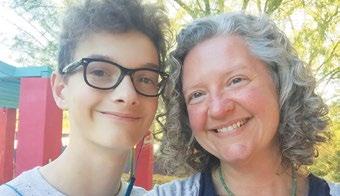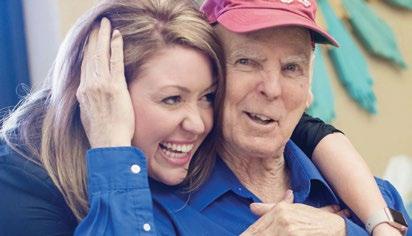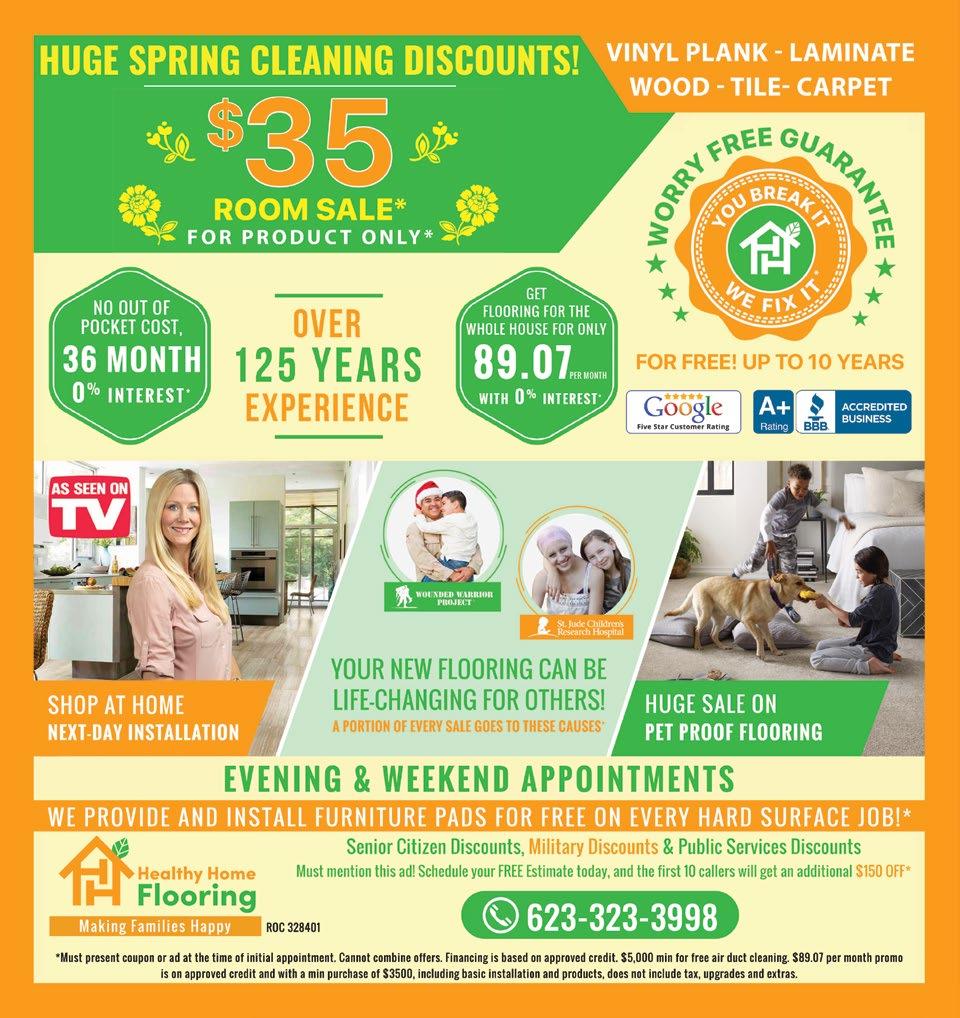
6 minute read
Health
Anna Lunaria, MsAc. L.Ac. CMT CYT CHT Specializing in Chronic Pain & Autoimmune • 26 years of experience
Are you ready to feel better naturally? Book Now! $10 o New Patients
Feel Better with Acupuncture

“Anna has been instrumental in helping manage my autoimmune chronic pain and fatigue. She is truly a miracle worker and I am incredibly grateful for her.” A.S. “I’ve suffered from a combination of hives and severe headaches due to stress. After acupuncture from Anna for the fi rst time I’ve seen real progress. I’ve rarely met people like Anna; she is dedicated to her patients, takes time to understand their diffi culties and communicates a sense of hope.” S.L. “Anna worked on my Rotator Cuff, my Hip, and the Neuropathy in my feet. All of these have shown signifi cant improvement. I recommend Anna to everyone I come in contact with.” J.K.
Yin Rising Acupuncture has two locations:
North Phoenix Tempe 10880 N 32nd St Suite 15 (& Shea) 6101 S Rural Rd Suite 112 (480) 206-6199 Call/Text • www.yinrising.com Book Online
Health
Naturopathic Support for Autoimmunity
By Dr. Jenna Dye, Naturopathic Physician
An autoimmune disease is an illness in which the body attacks itself. Normally, the immune system is able to tell the difference between something foreign such as a virus or bacteria and its own cells. With an autoimmune disease the immune system is misdirected and begins to fight its own tissues. This results in an inflammatory process that can lead to a number of symptoms. Often times these symptoms can be non-specific and difficult to identify.
Autoimmune disease can affect many body systems such as the thyroid tissue in Grave’s Disease or Hashimoto’s Thyroiditis, the gastrointestinal system such as Celiac Disease, Crohn’s Disease or Ulcerative Colitis, the musculoskeletal system in Rheumatoid Arthritis, and the skin in Psoriasis, just to name a few.
Autoimmune disease can have a genetic component as well as be triggered by environmental factors such as stress, infections, hormonal influences, nutrient deficiencies, diet and lifestyle. Often times medications are given to suppress the immune system so that it lessens the attack on itself. In naturopathic medicine, the focus is to identify the root cause of the illness. Each person is treated individually and the goal for autoimmune disease to address the potential triggers for the inflammation.
DIET
Our gut and how we digest and absorb nutrients are a primary focus in most autoimmune diseases. Diet is a standard baseline. We focus on low inflammatory foods that include nutrient dense vegetables and fruits such as dark leafy greens and berries. These nutrient dense foods are packed with antioxidants and phytonutrients that can inhibit the inflammatory pathways that are exacerbated in autoimmune disease. Foods high in healthy fats such as coldwater fatty fish, walnuts and avocados can help decrease inflammation. We also focus on diets low in processed foods, added sugars and refined carbohydrates. These types of foods can aggravate inflammation, thus making the attack on the body stronger. It is also important to stay away from any food sensitivities and allergies as these will produce more inflammation in the body. Common food sensitivities with autoimmune disease are foods such as dairy, wheat and eggs.
STRESS
There is a strong correlation with stress and autoimmune diseases. Stress can come in many forms and, for someone with an autoimmune disease, it is essential to control the levels of stress. This can be physical, mental and emotional stress. Stress will negatively affect the immune system and can lead to more misfiring of those elements that flare up the autoimmune illness. Supporting the individual with lifestyle changes to reduce stressors is very important.
NUTRIENT DEFICIENCIES
Foundational work is essential for anyone with an autoimmune disease or family history of autoimmune disease. Nutrient deficiencies are common and, if corrected, can protect and strengthen the immune system. Common deficiencies are Vitamin D, B Vitamins, magnesium, and many more. It is helpful to have these levels tested for proper supplementation.
With the focus on diet, lifestyle, nutrient deficiencies and supplementation it is possible to shift the immune response and go into remission. Continued naturopathic support is essential to prevent flare ups of the particular autoimmune disease. A naturopathic physician can individualize treatment for optimal support.
Dr. Jenna Dye is a licensed naturopathic physician. Her role is to support the body’s inherent ability to restore and maintain optimal health. Together with her patients, this is achieved by identifying and removing barriers that may be impacting health while creating a healing environment. For more information, visit drjennadye.com.
Health
Take a Trip Down Memory Lane with Photographs, Music, and Storytelling
By Jennifer Clancy
Today nearly six million Americans live with dementia, and 95% of them are cared for at home by a family member. It’s a challenging, sometimes overwhelming, and often heartbreaking experience watching a loved one struggle to do things that were once so easy for them. If you are one of these family caregivers, be sure to connect with the Arizona Alzheimer’s Association for the latest news, support groups (virtual and in-person), and ideas for keeping your loved one engaged.
Every day, those who care for their loved ones search for meaningful ways to engage them. These family caregivers aren’t looking for simplistic activities; they know the value of brain stimulation, and they know their person’s history. The solution needs to be easy to use, fun, and encouraging. People love to learn, they love to create, and they love to laugh. Here are three great ideas for engaging a loved one living with dementia.
Photographs: Pictures can inspire recall and often lead to great storytelling. Keep a basket of photographs handy that can be quickly accessed, held, and touched. Invite your loved one to select a photo and encourage them to tell you what they see. For example, who is in the photo and what are they doing? If the person has difficulty verbalizing what they see, help tell the story with them.

Music: Search the internet and YouTube for songs that were popular during your loved one’s life. Singing or humming familiar music during the day can assist with transitions and even reduce anxiety and provide relaxation.
Storytelling: For those living with dementia, the past is their world. How do we bring the past to the present? We create space in our lives for the stories they have told over and over again. We help them celebrate that story by writing it down and posting it with a favorite photo.
Adults living with dementia deserve to be treated with dignity and respect. What can be better than helping them celebrate their lives with people, places, and events from their past?
Jennifer Clancy is the founder of Phoenix-based Alle Learning, EngAGE EnCOURAGE, and Engaging at Home. ALLE Learning provides interactive lifelong learning opportunities for active senior communities. EngAGE EnCOURAGE provides interactive curriculum for senior day centers and other providers for those with dementia. Engaging at Home provides online classes for home-based caregivers looking after a loved one with dementia that give family members and loved ones an opportunity to share meaningful moments.
Creating a Legacy of Love
An innovative at-home engagement program, a turn key tool for you to use with those affected by dementia. It promises compassion and validation for all involved, easily accessible on the web.

Engage and inspire your loved one with dementia with fun, intriguing topics, creative workshops, and ways for the whole family to participate.
Find out more: www.engagingathome.com
“I do this with my Grandpa every week and he feels valued, loved and connected.“ —Shannon










